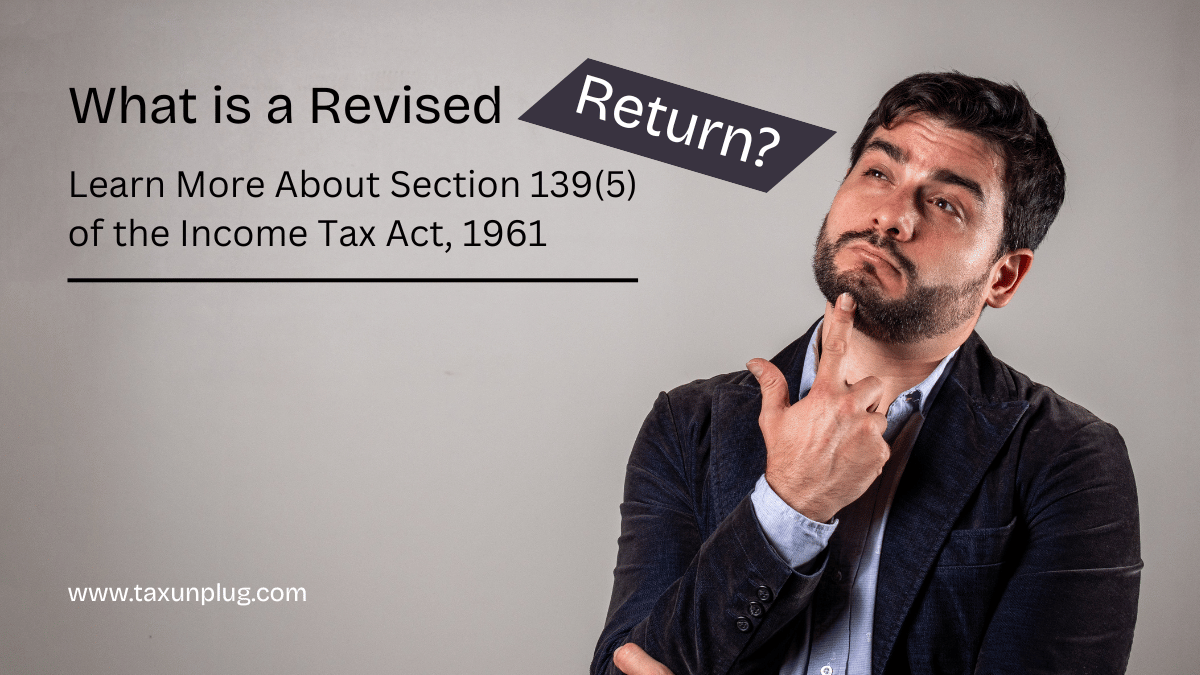What is a Revised Return?
Filing income tax returns (ITR) is a crucial responsibility for taxpayers. However, mistakes can happen while filing a return. To correct these errors, the Income Tax Act, 1961, provides an option to file a Revised Return under Section 139(5). In this article, we will discuss what a revised return is, when and how to file it, and important considerations to keep in mind.
What is a Revised Return?
A Revised Return is a rectified version of an originally filed Income Tax Return. If a taxpayer realizes an error or omission in their ITR after submission, they can correct it by filing a revised return under Section 139(5) of the Income Tax Act, 1961.
Errors may include:
- Incorrect income details
- Missed deductions or exemptions
- Incorrect personal information
- Mistaken tax calculations
Who Can File a Revised Return?
Any taxpayer who has already filed their original ITR within the due date under Section 139(1) can file a revised return. This applies to individuals, businesses, and companies that have made errors in their tax returns.
Time Limit for Filing a Revised Return
As per Section 139(5), a revised return can be filed before the end of the assessment year or before the completion of the assessment by the Income Tax Department, whichever is earlier.
For instance, If you filed your ITR for FY 2023-24 (AY 2024-25), you can revise it by on or before 31st December 2024, if the original return has not been assessed. However, the CBDT has extended due date for FY 2023-24 to 15th January, 2025.
How to File a Revised Return Under Section 139(5)?
Filing a revised return is simple and can be done online through the Income Tax e-Filing Portal. Follow these steps:
- Login to the e-Filing Portal – Visit www.incometax.gov.in and log in with your credentials.
- Click on “e-File” tab from left sided menu and expand it to select ‘File Income Tax Return’ under the section of “Income Tax Return”.

- Select “assessment year” for which you are revising your ITR and mode of filing to “Online”
- Under “Filing Type”, Select “Revised Return u/s 139(5)” from drop down menu.

- Select appropriate “ITR form type” and proceed.
- Make Corrections and rectify the errors in the return and preview your ITR once again before further processing.
- Submit your ITR an d verify by choosing an appropriate verification method (Aadhaar OTP, EVC, or sending a signed ITR-V to CPC).
Key Benefits of Filing a Revised Return
Filing a Revised Return under Section 139(5) ensures:
- Correction of mistakes to avoid penalties or scrutiny.
- Claiming missed deductions and exemptions.
- Avoiding tax notices due to errors in the original return.
Things to Remember While Filing a Revised Return
- Multiple revisions are allowed, but each revised return should be accurate.
- Refund claims are possible, if applicable.
- If assessment is completed, a revised return cannot be filed.
- Revising does not guarantee exemption from penalties in case of fraudulent claims.
FAQs on Revised Return Under Section 139(5)
1. Can I file a revised return after the assessment is completed?
No, once the tax department completes the assessment, you cannot file a revised return.
2. How many times can I revise my return?
You can revise your return multiple times before the deadline, but excessive revisions may trigger scrutiny.
3. Will filing a revised return lead to penalties?
No penalties are imposed for filing a genuine revised return. However, intentional misreporting can attract penalties.
4. What happens if I don’t file a revised return despite errors?
Failing to correct errors may lead to tax notices, interest, or penalties from the Income Tax Department.
5. Can a revised return increase my refund amount?
Yes, if you missed claiming deductions earlier, a revised return can increase your tax refund.
Conclusion
Filing an Income Tax Revised Return under Section 139(5) allows taxpayers to correct mistakes and avoid penalties. Ensure timely corrections and file before the deadline to stay compliant. Always double-check your return before submission to minimize errors in the first place.
Connect with us at Taxunplug for all your tax needs, we will take care of all the sticky things and helps to take timely action, and ensure compliance to avoid legal complications.The information provided in this blog is for general informational purposes only and should not be considered legal or tax advice. Please stay updated with the latest regulations related to the above details. We recommend consulting a qualified tax professional, such as Taxunplug, for expert assistance with all your tax matters.

